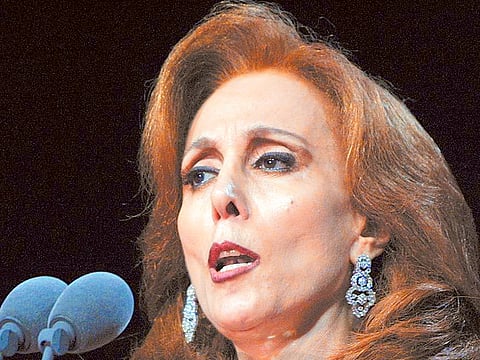Fairuz criticism sparks fury in Lebanon
Iconic Lebanese diva falls victim to social divisions over Syria

Beirut: The latest Lebanese controversy was ushered in a few days ago by Hasan Sabra, after the owner and editor-in-chief of Al Shiraa magazine placed a photograph of the Arab world’s leading singer on its cover, with the following headline: “Fairuz, the people’s enemy, the admirer of money and whiskey and the conspirator with [Syrian President Bashar] Al Assad.”
As expected, the accusations against the Lebanese national icon drew sharp criticisms, including from the Minister of Culture, Raymond Areiji, who defended Fairuz and refuted Sabra’s allegations.
The cover of Al Shiraa, which famously broke the November 1986 story about arms sales from the United States to Iran and that was later linked to funding of the Nicaraguan Contras that embarrassed President Ronald Reagan, was controversial in the extreme. Although Fairuz and her musical family, the Rahbani brothers, who helped shape her singing career and worked closely with her brother-in-law, Mansour—seldom kept their political preferences private, many perceived the pro-Al Assad zeal to be excessive and not necessarily in Lebanon’s interests.
In 2008, that is three years after the Cedar Revolution that forced Damascus to withdraw its military from Lebanon, Fairuz held a highly publicised concert in the Syrian capital that angered some of her fans. Leading politicians described Syria as “enemy territory in the grip of a brutal secret police force,” with the head of the Progressive Socialist Party, the Druze warlord Walid Junblatt, accusing the diva of “playing into the hands of Syrian intelligence services.” Akram Shehayed, the current Minister of Agriculture, then said that “those who love Lebanon do not sing for its jailers,” in reference to missing Lebanese believed to have been kidnapped during the three decades long Syrian occupation and whose fates were still unclear.
For Sabra, who is known for his harsh criticism of Al Assad’s regime, the time was overdue to expose Fairuz for standing with the Al Assad regime, though Minister Areiji, a pro-Syrian March 8 coalition member, “insulting her is an assault on our dreams and memories.” It was unclear whether Areiji spoke for his constituents or for the entire country, and while Fairuz was beloved by a majority, her politics were not necessarily admired by at least half of the nation.
This latest controversy revealed that there were no longer any taboos left in Lebanon as its population was sharply divided between pro- and anti-Syrian factions. Many harboured vociferous political differences, assuming that the effects of the Syrian Civil War would, sooner of later, spill over into Lebanon. Others wished to put the Syrian control behind them, distancing themselves from any associations with the Baath regime in Damascus. For her part, Fairuz refrained from commenting on the controversies that accompanied her artistic decisions, then as now. As an Arab nationalist, she believed that Damascus remained a “role model of art, culture and authenticity” although she failed to make any references to the ongoing war that destroyed Syria and where art, culture and authenticity were not priorities. She did not react to Sabra’s latest accusations though social media networks rushed to the diva’s assistance.
Sign up for the Daily Briefing
Get the latest news and updates straight to your inbox



